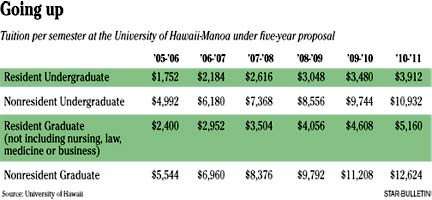
|
Few testify on
UH’s fee hike plan
Proposed tuition increases
get a mixed reception
at a public hearing
A proposal to raise tuition 123 percent over five years is "the largest tax increase on the middle class," the father of a University of Hawaii freshman said yesterday.
More hearings for
|
Peters was one of only eight people to speak yesterday at the UH Campus Center at the first public hearing on tuition hikes that would go into effect in the fall semester.
The Board of Regents will act in May on the university administration proposal to hike tuition for full-time UH resident students to $3,912 per semester in 2010 from $1,752 next fall. The cost per semester for resident community college students will climb to $1,335 from $735. Nonresident students would see similar increases, as would graduate students.
A UH undergraduate student pays "29 cents on the dollar" of the cost of college education, said Linda Johnsrud, interim associate vice president for academic planning and policy. "The other 71 cents come from the taxpayers."
At the end of the five-year plan, a student would be paying "47 cents on the dollar." For community college students, the share would go from 14 cents to 23 cents of each dollar in cost.
"Using students to make up for gaps the state Legislature left by withdrawing its support of the university is very bad public policy," said School of Social Work professor Joel Fischer. One year after the Legislature's 1996 decision to leave the university to its own budget process, "they began an unprecedented raid on university funds."
The only student to speak at the hearing agreed that "if you look at the people who should pay," Hawaii legislators and congressmen should not be let off the hook. Ikaika Hussey, a graduate student in political science, said "lawmakers should invest in higher education because it produces a population who understands the issues of the day."

Some speakers referred to the controversial Navy project, but interim UH President David McClain said there is no connection between it and the tuition hike. McClain and several top administrators, as well as Board of Regents Chairwoman Patricia Lee and four other board members attended the hearing.
Chuck Hayes, interim dean of the College of Natural Science, cited the difficulty in attracting new faculty, saying, "We have to raise tuition." "The mathematics department is hurting," and "the Chemistry Department faculty is down by one-third," he said.
"It's not just at the UH; tuition is increasing all over the country," Hayes said. "Comparing with the national average doesn't work. The cost of living is higher here."
Mathematics professor Thomas Ramsey said the "tuition is way too low." He said the university needs the funding to add new faculty and expand courses "to take care of the shift in student interest in a timely fashion."
Johnsrud said "one in six students" receives some form of tuition assistance, such as waivers from nonresident status for people in the military and those with Hawaiian ancestry from outside the state. Some $4.8 million in tuition waivers benefited 3,484 students in the 2003-04 school year.
www.hawaii.edu
[News] [Business] [Features] [Sports] [Editorial] [Do It Electric!]
[Classified Ads] [Search] [Subscribe] [Info] [Letter to Editor]
[Feedback]
